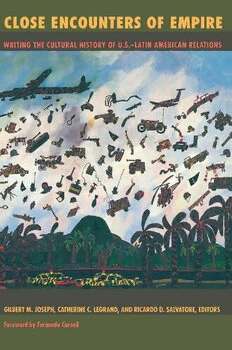
Close Encounters of Empire: Writing the Cultural History of U.S.-Latin American Relations PDF
Preview Close Encounters of Empire: Writing the Cultural History of U.S.-Latin American Relations
Close Encounters of Empire American Encounters/Globallnteractions A Series Edited by Gilbert M Joseph and Emily S. Rosenberg Close Encounters of Empire Writing the Cultural History of U.S.-Latin American Relations Edited by Gilbert M. Joseph, Catherine C. LeGrand, and Ricardo D. Salvatore With a Foreword by Fernando Coronil Duke University Press Durham and London 1998 © 1998 Duke University Press All rights reserved Printed in the United States of America on acid-free paper 00 Typeset in Times Roman with Frutiger display by Tseng Information Systems, Inc. Library of Congress Cataloging-in-Publication Data appear on the last printed page of this book. 3rd printing, 2006 This book was published with the assistance of the Frederick W Hilies Publications Fund of Yale University. Frontispiece: Rene d'Harnoncourt, American Artist in Mexico, 1932. Gouache. Courtesy of the d' Hamoncourt family. Photo: Philadelphia Museum of Art. American Encounters/Globallnteractions A series edited by Gilbert M. Joseph and Emily S. Rosenberg This series aims to stimulate critical perspectives and fresh interpretive frameworks for scholarship on the history of the imposing global presence of the United States. Its primary concerns include the deployment and contestation of power, the construction and deconstruction of cultural and political borders, the fluid meanings of intercultural encounters, and the complex interplay between the global and the local. American Encounters seeks to strengthen dialogue and collaboration between historians of U.S. international relations and area studies specialists. The series encourages scholarship based on multiarchival historical research. At the same time, it supports a recognition of the representational character of all stories about the past and promotes critical inquiry into issues of subjectivity and narrative. In the process, American Encounters strives to understand the context in which meanings related to nations, cultures, and political economy are continually produced, challenged, and reshaped. Contents Foreword Fernando Coronil IX Preface xiii I: Theoretical Concerns Close Encounters: Toward a New Cultural History of US.-Latin Ameri can Relations Gilbert M. Joseph 3 The Decentered Center and the Expansionist Periphery: The Paradoxes of Foreign-Local Encounter Steve 1 Stern 47 The Enterprise of Knowledge: Representational Machines of Informal Empire Ricardo D. Salvatore 69 II: Empirical Studies Landscape and the Imperial Subject: US. Images of the Andes, 1859- 1930 Deborah Poole 107 Love in the Tropics: Marriage, Divorce, and the Construction of Benevo lent Colonialism in Puerto Rico, 1898-1910 Eileen 1 Findlay 139 Mercenaries in the Theater of War: Publicity, Technology, and the Illusion of Power during the Brazilian Naval Revolt of 1893 Steven C. Topik 173 The Sandino Rebellion Revisited: Civil War, Imperialism, Popular Nation alism, and State Formation Muddied Up Together in the Segovias of Nicaragua, 1926-1934 Michael 1 Schroeder 208 The Cult of the Airplane among US. Military Men and Dominicans during the US. Occupation and the Trujillo Regime Eric Paul Roorda 269 Central American Encounters with Rockefeller Public Health, 1914-1921 Steven Palmer 311 Living in Macondo: Economy and Culture in a United Fruit Company Banana Enclave in Colombia Catherine C. LeGrand 333 From Welfare Capitalism to the Free Market in Chile: Gender, Culture, and Politics in the Copper Mines Thomas Miller Klubock 369 Everyday Forms of Transnational Collaboration: US. Film Propaganda in Cold War Mexico Seth Fein 400 Gringo Chickens with Worms: Food and Nationalism in the Dominican Republic Lauren Derby 451 viii Contents III: Final Reflections Turning to Culture Emily S. Rosenberg 497 Social Fields and Cultural Encounters William Roseberry 515 From Reading to Seeing: Doing and Undoing Imperialism in the Visual Arts Marfa del Carmen Suescun Pozas 525 Contributors 557 Index 563 Fernando Coronil Foreword A pathbreaking study of U.S.-Latin American relations, Close Encounters of Empire is also a landmark of postcolonial studies in the Americas. The product of a conference at Yale University, this unusually coherent collec tion of essays reflects vigorous collective discussions, painstaking scholar ship, and skilled editorial work. While the individual cases examine with sophistication a wide range of imperial encounters in the Americas, the introduction and the two concluding interpretive essays relate the studies to each other and discuss their collective achievements. I will exchange the opportunity to comment further on the case studies for the chance to discuss this volume's theoretical contribution to the broader field of post colonial studies. The authors of these essays treat postcolonial encounters in the Ameri cas as complex affairs involving multiple agents, elaborate cultural con structs, and unforeseen outcomes. While evidently inspired by recent de velopments in social theory associated with cultural and feminist studies, as well as with poststructuralism and postcolonialism, the essays also build on a long tradition of Latin American scholarship on colonialism and imperialism. The book's theoretical importance results from the di verse ways in which its authors establish, often implicitly, a dialogue among these diverse bodies of scholarship. In the introduction Gil Joseph highlights the significance of this dia logue, noting that the collection is distinguished by the pioneering use of postmodern approaches to the analysis of U.S.-Latin American relations. As Joseph observes, while the essays are informed by a postmodern sensi tivity to the formation of subaltern subjects, the ambiguities of power, and the multi stranded character of historical processes, they do not abandon a more traditional concern with large-scale historical contexts and over arching political relations. Through the interplay of these approaches, the essays treat the "encounter" between the United States and Latin America as a complex interaction among unequal social actors, illuminating in new ways their modes of cooperation, subjection, and resistance under chang ing historical conditions. This collection's engagement with modern and postmodern approaches is also underlined by Rosenberg and Roseberry in the two interpretive
